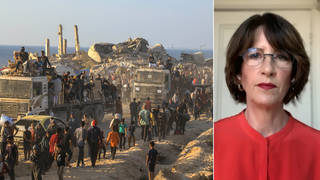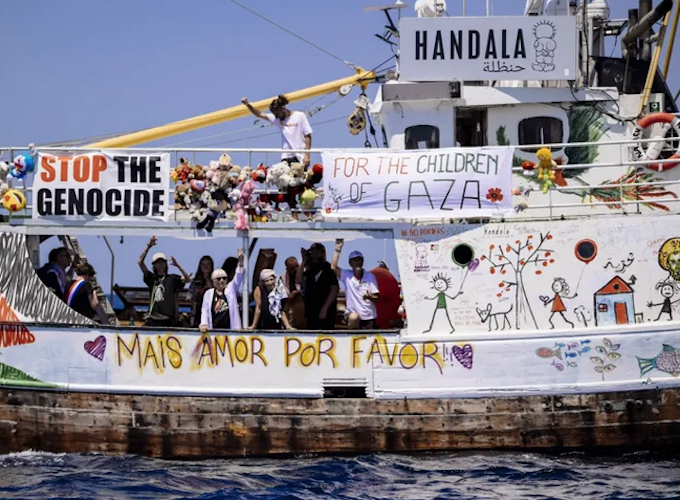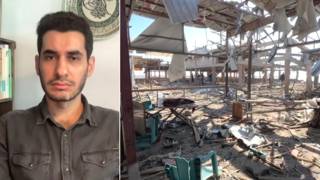 Contrary to popular belief, it turns out that sharks have an undeserved reputation for indiscriminate lethal attacks on people whose blood they detect in the water. In fact, sharks much prefer their customary aquatic prey, can tell the difference between that blood type category and others, and will therefore usually spurn edible humans that might be on offer in favour of marine animals. As food for sharks, people are a rare and usually accidental option.
Contrary to popular belief, it turns out that sharks have an undeserved reputation for indiscriminate lethal attacks on people whose blood they detect in the water. In fact, sharks much prefer their customary aquatic prey, can tell the difference between that blood type category and others, and will therefore usually spurn edible humans that might be on offer in favour of marine animals. As food for sharks, people are a rare and usually accidental option.
No such luck with corporate-controlled capitalist governments, however. For them, so long as they yield a profit for their corporate paymasters, the sources of pretty much any old ‘blood’ will do and the more of them the merrier.
Among other things, this means that human casualties count for little or nothing so long as they are ‘over there’, do not look like ‘us’, and the killing of them can be rationalised in terms of the so-called ‘national interest’ (a catch-all that excuses doing more or less anything you like).
I mention this because I have just finished reading and commenting on Kim McGrath’s excellent and sobering book manuscript, entitled, ‘Bloody Treaty’: Australia’s Kissingerian pursuit of oil and gas in the Timor Sea (forthcoming, Melbourne University Press) (unless otherwise indicated, quotes that follow are from this source).
The book is important because it reveals in meticulous, excruciating detail how thoroughly unscrupulous, insouciant, and unrelenting Australian governments of all political persuasions have been in their pursuit of the oil and gas riches discovered in the seas that separate northern Australia from Indonesia and Timor Leste. And how, in their unseemly haste – their stampede – to acquire as much as possible of those resources, they trampled on the people of what is now the independent country of Timor-Leste and were complicit in what amounted to genocide.
The purpose of this essay is to consider briefly why it is that countries like Australia behave in this way.
In doing so, first, it gives an inkling of the human suffering of the Timorese people during a period that began with the invasion by Indonesia (in December 1975) of what was then East Timor and continued until the country attained independence in May 2002. Second, it discusses the extent of Australia’s complicity in the crimes that were committed – how far governments were prepared to stoop to get what they wanted – and the reasons for this. And third, it speculates about possible causes and implications.
During the period October 2001 to July 2008, I carried out five short-term consultancies (four for UNDP and one for UNDP/World Bank) and one long-term (two-year) assignment for AusAID in East Timor/Timor-Leste and can therefore attest personally to the devastating social and institutional consequences of the occupation and slaughter.
The discussion that follows draws principally on McGrath’s book, but also on observations made during my consulting assignments.
Carnage, Societal Turmoil, and Complicity
Australia’s attitude to East Timor has deep roots. As long ago as the 1960s, responding to Washington sources who were encouraging Australia to ‘approach the Portuguese at the highest level and insist it is time the people of Portuguese Timor were brought into the 20th Century’, Attorney-General and External Affairs Minister, Garfield Barwick, advised cabinet that Portuguese Timor was ‘an anachronism and can’t survive’. The solution he proposed was to ‘get it quietly transferred to Indonesia’. Barwick insisted that it was ‘difficult to see a practicable alternative to the Timorese people joining Indonesia.’
These are telling statements that set the tone for Australia’s relations with the Timorese people for the next half century. The subtext clearly being that the Timorese were a backward and inferior people who needed to be taught a thing or two about the modern world. It is not difficult to see how such beliefs endured and, so long as they could be said to be furthering the national interest, turned to condoning ‘appropriate’ lessons being taught and even a little (and clearly much needed) ‘culling’ here and there. Views that received considerable lubrication from the subsequent discovery of large quantities of oil in the Timor Sea.
The extent of the carnage in East Timor following its occupation by Indonesia in 1975 can be conveyed by a few stark statistics. Australian- and US-backed Indonesian rule of East-Timor resulted in the deaths of more than 200,000 East Timorese – equivalent at the time to 25% to 30% of the population (do the sums and extrapolate to the US or Australian populations) – and widespread rape and torture. According to Noam Chomsky, this was comparable to the atrocities in Cambodia committed by the Khmer Rouge in the 1970s and 1980s.
More of the same followed the 1999 vote for independence. Within a few weeks, an additional 10,000 people had been killed and more than 250,000 were forced across the border into Indonesian West Timor.
In 2002, I described the state of the country’s infrastructure as follows:
… the situation was one of total devastation: of the institutions of government, of basic services, and of infrastructure.
For example, late in 2000, 37 out of a total of 58 power stations were inoperable. Forty per cent (68,000) of houses and seventy per cent of all public buildings had been destroyed – government offices, schools, hospitals, seed production facilities, animal clinics, and medical and animal laboratories. In addition, forty per cent of all livestock [had] either [been] killed or taken to West Timor.
Every bank [had been] looted, which rendered the banking and payments system inoperable. All property records [had been] destroyed, and land and property ownership [became] a serious problem.
Another disturbing and striking feature of Timorese society, which I observed in 2008, was the degree to which after
… more than 25 years of war and, since independence, several more years in which sporadic internecine conflict has occurred have inured people to violence and created generations of men who regard violence as the major means of problem resolution available to them. This experience also seems to have had the effect of raising the social status of violence among young men – to a point where it is seen as an essential expression of masculinity and as a rite of passage to manhood, conferring prestige and status that cannot be gained in other ways.
Australia’s Response and Corporate Reciprocity
In order not to jeopardise negotiations over sea boundaries and the control of the oil and gas bonanza that lay beneath the waves, at no time did a seemingly purblind Australian government criticise or question Indonesia’s actions. Throughout, Australia’s sole concerns were fossil fuel acquisition and profit.
Later, when negotiating with an independent Timor-Leste, in order to gain advantage whatever the cost in terms of honour or dignity or fair dealing, the Australian government resorted – under the guise of a development assistance project (!) – to bugging the cabinet room of a fledgling Timorese government exhausted by years of war; to prosecuting Australian whistleblowers who threatened to expose its bad behaviour; and, unless they suited their avaricious purposes, to showing a cavalier disregard for international laws and conventions.
On the question of reciprocity, the cosy relationship between government and the fossil fuel corporations followed a familiar pattern, which meant that as officials were spun out of DFAT’s revolving door or other high government office a significant number of them either had velvet cushioned landings in the boardrooms of the corporations (Woodside etc.) whose interests they had been pursuing with such selfless (!) zeal in their official capacities, or they popped up as highly paid consultants to the same corporations.
The perfidy that characterised Australia’s treatment of the Timorese people, which included being an accessory to genocide, is referred to by McGrath as ‘Kissingerian realism.’
Opportunism with One End in Mind
Throughout this shameful history, in its relations with Portugal, Indonesia, and with an independent Timor-Leste, for the Australian government, the constants were oil and gas, the sea boundaries that determined who got what, and the money.
Otherwise, like a reptile that sheds its skins, succeeding governments presented themselves to those they felt held the key to these treasures at different times in ways that were designed solely to please and to obtain the best possible deal.
Conclusion
There are salutary lessons to be learned from McGrath’s compelling record (based in large part on now public official documents and correspondence) of how the people of Timor-Leste were treated by Australia and the reasons for this. Most obviously because it sets out in detail the sordid things that our governments are prepared to do – and cover up – in our names when there is money to be made, and how deep are the wells of their hypocrisy and betrayal and how frequently and remorselessly they draw upon them.
We can only imagine how much worse a picture McGrath might have presented had she had access to the many official documents that have not been released because, we are told, doing so would compromise the ‘national interest’ (that term again).
But perhaps the main lesson to be drawn from this work is that much the same motives and allegiances that drove Australia to do what it did to the Timorese are likely to be shaping government responses to what is happening now in Palestine (where, no doubt, its well-rehearsed denial of genocide will have come in handy) and the Ukraine, the Middle East generally, and regarding China.
The feculent government behaviour alluded to here and discussed in dispassionate detail in McGrath’s book was not so much a function of the colourful personalities involved as it was a central, ineluctable (structural) feature of the savage capitalism practised by the Australian state and its subservience to its delusionally omniscient and would-be omnipotent lord and master in the US.
It is plausible that our governments’ easy accommodation to such influences arises in part from the fact that settler-societies like Australia have a congenital proclivity for doing this sort of thing. A structural habit that reflects the violence of their creation and the capitalist system that depends on it, and is fertilised by a discriminatory, patronising, and dismissive view of the ‘other’.
But, clearly, this is no excuse.
All the while, scorched repeatedly by the dragon’s breath of Australian governments that, despite the sometimes warm words, cared only about profits from fossil fuels and the drawing of nautical boundary lines so as to maximise them, the people of Timor-Leste have had to endure genocide and other atrocities and in too many instances to make do with what might be said to be the leftovers of what is rightfully theirs.
In the light of this, no need to dwell on the prospects for realising from those responsible even the bare minimum of remorse, or anything like an ethical governmental response for the people of Timor-Leste that might approach that suggested by Chomsky: ‘We cannot undo the past, but we should at least be willing to recognize what we have done, and to face the moral responsibility of saving the remnants and providing ample reparations, a pathetic gesture of compensation for terrible crimes.’
Give me a (wrongly maligned) shark any day!
The post
Blood in the Water: Profit over the People of Timor-Leste first appeared on
Dissident Voice.
This post was originally published on Dissident Voice.




